ISLAMABAD: In the face of a ballooning balance of payments crisis, with the rupee having lost a third of its value and inflation at a five-year high, Pakistan’s powerful military agreed this month to a rare freeze of its hefty budget to help ease the South Asian nation’s slowing economy.
The “critical financial situation,” according to military officials, senior government officers and experts, has also convinced the army that the time to watch the economic downturn from the sidelines is over.
On Tuesday, the government announced a high-powered National Development Council (NDC) that will set the country’s long-term economic policy, and of which the all-powerful army chief, General Qamar Javed Bajwa, will be a member. Both officials and analysts see the move as one of the military’s boldest forays into civilian life in recent years.
In Pakistan, power has changed hands more often through coups than elections and civilian governments have traditionally been subservient to generals on issues of national security — from the fight against Taliban insurgents to ties with arch-rivals India and Afghanistan.
But this is the first time the army has been given a formal seat at the economic table.
With a military expenditure of $11.4 billion in 2018, both government and military officials say the army’s worries about a worsening economic outlook are fair. But analysts also warn that the government will only emerge weakened from a decision to give yet more power to arguably the most powerful institution in Pakistan.
A cabinet member with knowledge of the new council’s formation said being a part of the body would allow the army chief to have a greater say in “the discharge of executive powers.” He declined to be named due to the sensitivity of discussing the inner workings of the military.
“Clearly, the army thinks that it [government] is struggling with the day to day running [of the economy] and so they are saying, ‘we can give our input’” the official said.
Less than a year ago, as cricketer-turned-politician Imran Khan swept to power in a milestone poll that marked only Pakistan’s second transition from one elected government to another, no one could have foreseen he would be in so much trouble. But a crumbling economy in the last many months has seen Prime Minister Khan forced into an International Monetary Fund bailout and running to the military for cover, experts say.
Revenue Minister Hammad Azhar rejected this notion, saying the purpose of the new council was simply to create consensus among all stakeholders.
“It’s not really in the country’s interests that separate wings of the government, whether it’s the executive, the cabinet, the parliament or the military … if they’re not on one page or they’re undercutting one another or playing games with one another,” Azhar said in an interview with Arab News on Tuesday evening.
At the end of the day, the prime minister would be “the final decision-maker” in the council, he said, adding that it was illogical to conclude that military coups in the past meant the government should now “exclude the military from all spheres of the consultative process.”
“Whether anyone likes it or not, the Pakistani military has a huge claim on Pakistan’s budget … So naturally they [army] are directly affected by economic issues,” Azhar said.
The Pakistani army has for years been fighting Taliban insurgents holed up in the country’s northwestern tribal regions bordering Afghanistan and shocking the nuclear-armed state with their ability to launch attacks on both civilian and military targets. Though security has improved in recent years, militants still carry out sporadic assaults.
Pakistan also has tense relations with neighboring India to the east and Afghanistan to the west. It has fought three wars with India since independence from the British in 1947, and early this year, the two countries launched aerial strikes on each other and fought a brief dogfight over Kashmir skies.
“Given the security situation and our geostrategic position, it is also vital that we [government] solicit input from them [army] and give them our input,” Azhar said.
The army’s media wing declined official comment for this article but one military official close to the discussions said the army had “real stakes” in the economy and a right to provide input.
“With this body we can do it in an above-board way,” he said. “We will give recommendations and it is on the government, on cabinet, as and when they accept them.”
“VETTING BODY”
The exact mandate and powers of the body are as yet unclear, experts and officials said.
Two of the broad terms of reference mentioned in the statement announcing the new council relate to regional connectivity and cooperation, suggesting that the army will now have an outsized role in the planning and implementation of international projects.
These include a $60 billion China-Pakistan Economic Corridor of energy and infrastructure projects, free-trade agreements and transnational pipeline deals with various countries, and loan and aid agreements with friendly nations like Saudi Arabia and the United Arab Emirates.
The appearance of the word “approve” in the terms of reference has also raised questions over whether the council has powers over and above the cabinet, usually the final authority on policy matters.
This month, Pakistan proposed a belt-tightening budget to tame its fiscal deficit, targeting federal tax revenues of 5.55 trillion rupees ($36.80 billion) and setting austerity measures for both civilian and military rulers.
In this context, Khurram Husain, the business editor for Dawn newspaper, said the new council might also allow the army to exercise “control over revenue and taxation, approval of individual expenditure items, rate policy, customs duties ... the day to day exercise of prime ministerial powers.”
The cabinet member with knowledge of the NDC’s establishment said the body was initially conceived merely as a discussion forum but it’s “exact role will evolve over the coming weeks and months … how exactly and to what extent it can approve decisions.”
Mohammad Malick, a political anchor and head of Hum News channel, said it was unclear how often the body would meet and at what level it would become involved in economic decision-making.
“At the planning stage? Before a matter goes to the cabinet?” he asked. “If the body’s role comes after the cabinet, then it becomes a supra-body and that will create complications because constitutionally, ultimate authority vests with the cabinet.”
“AN ADULT IN THE ROOM”
Whatever the exact terms of the new council, opposition politicians said its formation was evidence that the army was convinced the civilian government was not up to the economic task.
“To me the military’s inclusion [in the NDC] is more of a reflection on the civilian govt and its performance, that it needs to have the army chief come in and create some discipline and consistency in economic policy,” Miftah Ismail, Pakistan’s finance minister in the previous government, said. “The feeling is that this is beyond the government’s experience and competence and so they need an adult in the room.”
Ultimately, officials said, the purpose of the new council was “power sharing.”
“This is about sharing power and also sharing responsibility,” the cabinet member said. “Now the economy isn’t just the government’s problem. The army will also have to answer.”
But Dawn’s Husain warned that making the army a stakeholder in a major economic body was a step in the wrong direction for coup-prone Pakistan and its fledgling democracy.
“This represents a setback or a step in the opposite direction from the one that was taken in 2008,” he said, referring to the year that marked the end of Pakistan’s last era of direct military rule. “The direction seems to be going backwards toward pre-2008, rather than forward toward civilian supremacy.”
New council puts Pakistan army chief in economic driving seat
New council puts Pakistan army chief in economic driving seat
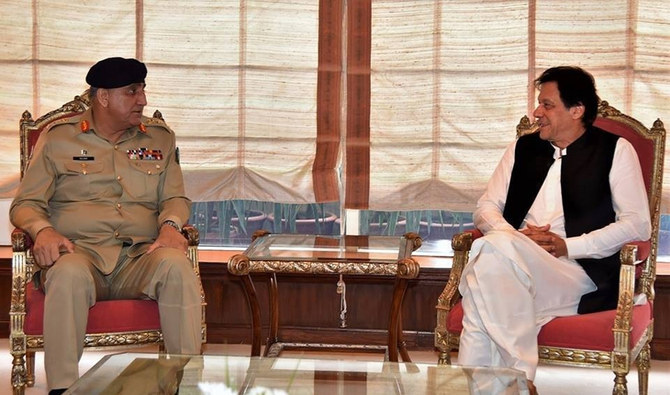
- This week the government announced a high-powered National Development Council of which the army chief will be a member
- Revenue Minister Hammad Azhar dispels notion body will dilute civilian power, says prime minister “the final decision-maker”
Pakistan commends UAE leadership for ‘swift’ response to record-breaking rains
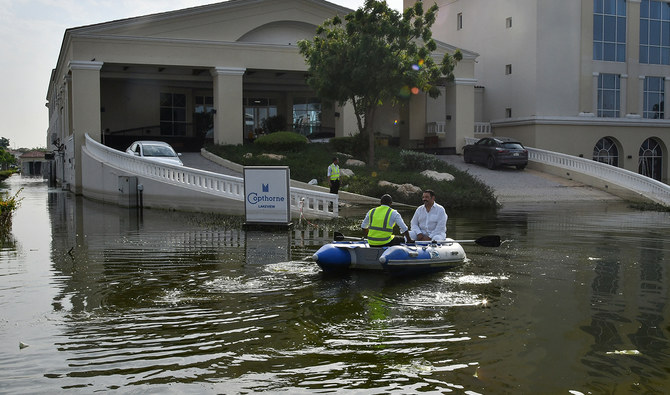
- Pakistan’s foreign minister telephones UAE counterpart, expresses sympathy over devastation caused by torrential rains
- Heavy rains lashed UAE last week, turning streets into rivers and hobbling Dubai airport, world’s busiest for global passengers
ISLAMABAD: Pakistan’s Foreign Minister Ishaq Dar on Wednesday commended the United Arab Emirates (UAE) leadership for its swift and efficient response to the devastation caused by record-breaking rains in the desert country.
Heavy rains lashed the desert country last week, turning streets into rivers and hobbling Dubai airport, the world’s busiest for international passengers.
The rainfall was the UAE’s heaviest since records began 75 years ago, dumping two years’ worth of rain on the desert country.
“Foreign Minister Ishaq Dar held telephone conversation with Foreign Minister His Highness Sheikh Abdullah Bin Zayed of United Arab Emirates to express deepest sympathy on the devastation caused by recent torrential rains,” Pakistan’s Ministry of Foreign Affairs (MoFA) said.
“He commended the leadership of the UAE for the swift, efficient and timely administrative response to this natural calamity,” it added.
The foreign ministry said both representatives also exchanged views on matters of bilateral and global importance.
Pakistan’s PM Sharif last Friday telephoned UAE President Sheikh Mohamed bin Zayed Al-Nahyan, urging both countries to collaborate to tackle the impacts of climate change.
Sharif had lauded the UAE president for his “outstanding leadership qualities” and strong commitment to ensure the welfare of the Emirati people.
Pakistan has been prone to natural disasters and consistently ranks among one of the most adversely affected countries due to the effects of climate change. Torrential rains have killed more than 90 people in the South Asian country this month, according to authorities.
Malala Yousafzai faces backlash for Clinton musical co-credit

- Malala Yousafzai co-produced “Suffs” musical with Hillary Clinton, which depicts American women’s struggle for right to vote
- Yousafzai has been condemned by some for partnering with Clinton, an ardent supporter of Israel’s war on Palestine
LAHORE: Nobel laureate Malala Yousafzai faced a backlash in her native Pakistan on Wednesday, after the premier of a Broadway musical she co-produced with former US Secretary of State Hillary Clinton.
The musical, titled “Suffs” and playing in New York since last week, depicts the American women’s suffrage campaign for the right to vote in the 20th century.
However Yousafzai, who was awarded the Nobel Peace Prize in 2014, has been condemned by some for partnering with Clinton, an outspoken supporter of Israel’s war against Hamas.
Pakistan has seen many fiercely emotional pro-Palestinian protests since the war in Gaza began last October.
“Her theater collaboration with Hillary Clinton — who stands for America’s unequivocal support for genocide of Palestinians — is a huge blow to her credibility as a human rights activist,” popular Pakistani columnist Mehr Tarar wrote on social media platform X.
“I consider it utterly tragic.”
Whilst Clinton has backed a military campaign to remove Hamas and rejected demands for a ceasefire, she has also explicitly called for protections for Palestinian civilians.
Yousafzai has publically condemned the civilian casualties and called for a ceasefire in Gaza.
The New York Times reported the 26-year-old wore a red-and-black pin to the “Suffs” premier last Thursday, signifying her support for a ceasefire.
But author and academic Nida Kirmani said on X that Yousafzai’s decision to partner with Clinton was “maddening and heartbreaking at the same time. What an utter disappointment.”
Israel’s military offensive has killed at least 34,262 people in Gaza, mostly women and children, according to the Hamas-run territory’s health ministry.
The war began with an unprecedented Hamas attack on October 7 that resulted in the deaths of around 1,170 people, according to an AFP tally of Israeli official figures.
Clinton served as America’s top diplomat during former president Barack Obama’s administration, which oversaw a campaign of drone strikes targeting Taliban militants in Pakistan and Afghanistan’s borderlands.
Yousafzai earned her Nobel Peace Prize after being shot in the head by the Pakistani Taliban as she pushed for girl’s education as a teenager in 2012.
However the drone war killed and maimed scores of civilians in Yousafzai’s home region, spurring more online criticism of the youngest Nobel Laureate, who earned the prize at 17.
Yousafzai is often viewed with suspicion in Pakistan, where critics accuse her of pushing a Western feminist and liberal political agenda on the conservative country.
Pakistan’s foreign minister calls for early resumption of PIA flights to Europe
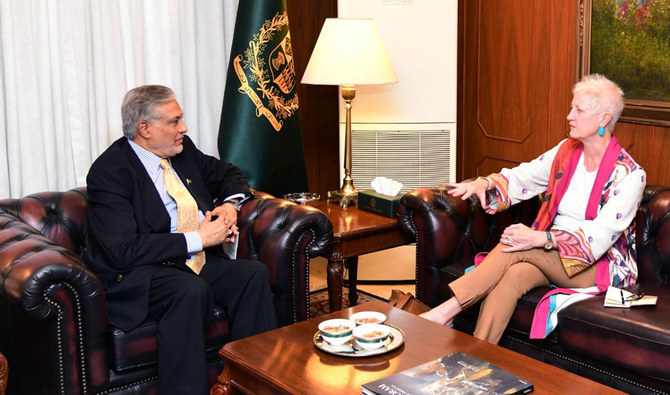
- Foreign Minister Ishaq Dar meets EU ambassador to discuss bilateral ties, trade and matters of mutual interest
- PIA flights to Europe and the UK have been suspended since 2020 following Pakistan’s infamous pilot license scandal
ISLAMABAD: Pakistan’s Foreign Minister Ishaq Dar on Wednesday stressed the resumption of direct flights from the country’s national airline to Europe, the foreign ministry said, in his meeting with EU Ambassador Riina Kionka during which both sides discussed bilateral relations, trade and matters of mutual interest.
PIA flights to Europe and the UK have been suspended since 2020 after the EU’s Aviation Safety Agency revoked the national carrier’s authorization to fly to the bloc following a pilot license scandal that rocked the country. The issue resulted in the grounding of 262 of Pakistan’s 860 pilots, including 141 of PIA’s 434.
Kionka and Dar discussed Pakistan-EU bilateral ties and important issues of mutual interest during their meeting, Pakistan’s Ministry of Foreign Affairs (MoFA) said. Dar told Kionka Pakistan views the EU as a “valued partner” and an important factor of stability during the current volatile times.
“FM emphasized the significance of direct flights between Pakistan and European countries in view of large diasporas,” MoFA said. “In this regard, he stressed on the need for an early resumption of PIA flights to Europe.”
Both sides also expressed satisfaction over the “significant progress” of Pakistan-EU institutional mechanisms and resolved to maintain the upward trajectory of their relations by increasing their high-level interactions.
“FM vowed to further strengthen the existing strategic partnership in all areas, inter alia, trade, migration, climate change,” MoFA said.
“The EU side assured their full cooperation to Pakistan in achieving the objectives of economic diplomacy.”
The EU is Pakistan’s second most important trading partner, accounting for over 14 percent of the country’s total trade and absorbing 28 percent of Pakistan’s total exports. Pakistani exports to the EU are dominated by textiles and clothing.
Pakistan’s GSP+ status is a special trade arrangement offered by the EU to developing economies in return for their commitment to implement 27 international conventions on human rights, environmental protection and governance.
Pakistan, Egypt among countries who pay most in surcharges to IMF— report
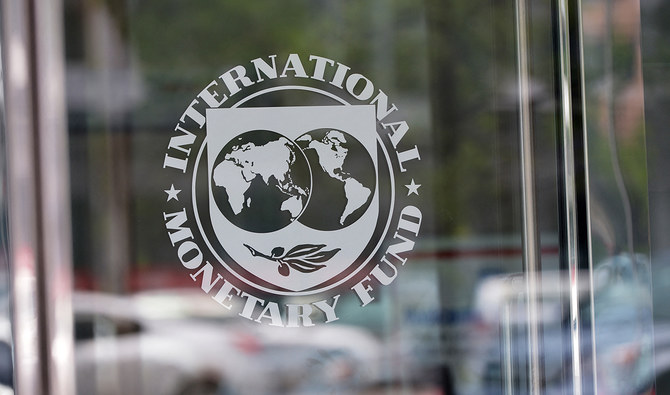
- Indebted member countries paid about $6.4 billion in surcharges between 2020-2023, says report by US think tanks
- Surcharges do not hasten repayment, instead punish countries already struggling with liquidity constraints, critics say
Countries, mostly middle and lower-income, have been burdened by surcharges on top of interest payments on their borrowings from the International Monetary Fund (IMF), widening global inequities, according to a report by US think tanks.
WHY IT’S IMPORTANT
Indebted member countries paid about $6.4 billion in surcharges between 2020-2023, the report from Boston University’s Global Development Policy Center and Columbia University’s Initiative for Policy Dialogue released on Tuesday showed.
And the number of countries paying these surcharges has more than doubled in the last four years.
The IMF is expected to charge an estimated $9.8 billion in surcharges in the next five years, according to an earlier report by the Center for Economic and Policy Research.
Critics of the policy argue that surcharges do not hasten repayment and instead punish countries already struggling with liquidity constraints, increase the risk of debt distress and divert scarce resources that could be used to boost the struggling economies.
BY THE NUMBERS
Countries such as Ukraine, Egypt, Argentina, Barbados and Pakistan pay the most in surcharges, the report showed, accounting for 90 percent of the IMF’s surcharge revenues.
These surcharges, levied on top of the fund’s increasingly steeper basic rate, are IMF’s single largest source of revenue, accounting for 50 percent of total revenue in 2023.
KEY QUOTES
“IMF surcharges are inherently pro-cyclical as they increase debt service payments when a borrowing country is most need of emergency financing,” Global Development Policy Center’s director Kevin Gallagher said.
“Increasing surcharges and global shocks are compounding the economic pressure on vulnerable countries.”
CONTEXT
Data published by the Institute of International Finance earlier this year showed global debt levels hit a record of $313 trillion in 2023, while the debt-to-GDP ratio — a reading indicating a country’s ability to pay back debts — across emerging economies also scaled fresh peaks.
IMF shareholders agreed last week on the importance of addressing challenges faced by low-income countries, Managing Director Kristalina Georgieva said on Friday.
ICC names Pakistan’s Sana Mir as Women’s T20 World Cup Qualifier ambassador
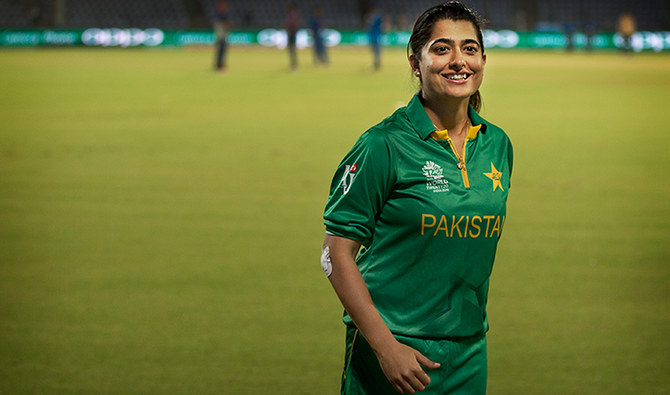
- Sana Mir led Pakistan in 137 of 226 international matches she played during her career
- Mir says will guide teams and players on how to deal with pressure in the tournament
ISLAMABAD: The International Cricket Council (ICC) on Wednesday named Pakistan’s former iconic cricketer Sana Mir as its ambassador for the upcoming Women’s T20 World Cup Qualifier tournament.
Former skipper Mir, considered widely as Pakistan’s best woman cricketer to date, will keep a keen eye on the tournament which would see 10 women’s teams battle it out for two spots at the ICC Women’s T20 World Cup 2024.
The first four matches of the tournament will take place tomorrow, Thursday, which is scheduled to go on till May 7.
The 10 teams have been divided into two groups of five, with the top two from each group entering the semifinals. The winning semifinalists confirm a trip to Bangladesh for the T20 World Cup later this year.
“ICC named Sana Mir, who represented Pakistan in 226 international games, 137 of them as skipper, as the ambassador of the Women’s T20 World Cup Qualifier on Wednesday, 24 April,” the cricket regulatory body said in a post on its website.
Mir told ICC the tournament would provide an excellent opportunity for fans to witness exciting cricket.
“The women’s game has become more and more competitive in recent years,” Mir said. “And the 10 nations involved in the Qualifier possess a number of quality players.”
Mir featured in several ICC tournaments during her impressive career. Her most memorable one was in the 2008 ICC Women’s Qualifying Series for the Women’s Cricket World Cup where Pakistan went all the way to the finals.
Sana won the joint Player of the Series award for the tournament. The Pakistani icon said she aims to share her expertise and experience with the international players as ambassador.
“My aim is to talk to the various teams and players during the Qualifier and help guide them on how to deal with the pressure of these events and what it takes to succeed,” Mir explained.
“Pakistan had a great record in these events, and I in particular have fond memories of the 2008 edition of the 50 over World Cup qualifier event that I played.”
Mir said that while Sri Lanka and Ireland were favorites to qualify for the World Cup, others had a chance to cause major upsets too.
“Teams like Scotland, Netherlands, United Arab Emirates, Uganda, and Zimbabwe surely have the potential to cause major upsets,” she said. “And make their way through to the semis and eventually to the final as well.”










